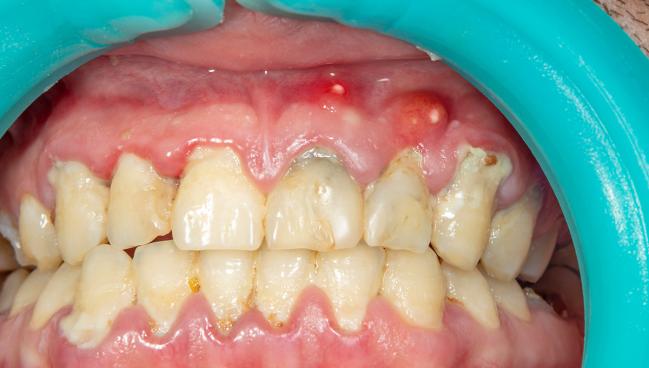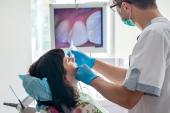Atrial Fibrosis Mediated by Gum Disease May Be Missing AF Link
If confirmed in additional studies, oral health could join obesity and cigarette smoking as modifiable risk factors for AF.

Periodontal disease may be a risk factor for atrial fibrillation (AF), according to data from a small Japanese study.
Among patients with AF undergoing left atrial appendage (LAA) excision surgery, the presence of bleeding gums, deep periodontal pockets, and gum inflammation all correlated with a greater risk of atrial fibrosis, known to be associated with the onset and persistence of AF and a possible contributor to the formation of LAA thrombus.
Researchers led by Shunsuke Miyauchi, MD, PhD (Hiroshima University, Japan), say that if further studies corroborate atrial fibrosis as a genuine link between poor dental hygiene and AF, it raises the possibility that oral health could be a modifiable risk factor like obesity, hypertension, and cigarette smoking.
One potential explanation for the connection between periodontitis, atrial fibrosis, and AF is systemic inflammatory activation, write Miyauchi and colleagues. When long-standing, low-grade inflammation of teeth and gums is present, they add, spillover of inflammatory mediators from periodontal tissues has been shown to exacerbate other systemic diseases such as diabetes, atherosclerosis, and rheumatoid arthritis, making it possible that it likewise aggravates AF.
Based on accumulating evidence of the importance of periodontal disease, they add, dental specialists could be important additions to multidisciplinary care teams managing AF risk.
Miyauchi is scheduled to present the study as a virtual poster at the upcoming American Heart Association 2022 Scientific Sessions; it was published online October 31, 2022, in JACC: Clinical Electrophysiology.
Andreas Goette, MD (St. Vincenz Hospital, Paderborn, Germany), who wrote an editorial accompanying the published study, notes that while the data suggest an association between periodontitis and atrial fibrosis, it does not demonstrate causation. Moreover, it is “unclear whether the release of inflammatory markers around infected teeth and oral tissue into the systemic circulation directly causes atrial changes . . .” or if other mechanisms are at play. Further studies “are now warranted to show that treatment of chronic periodontitis is atrial protective.”
Differences by AF Type
The study enrolled 76 patients (mean age 72 years; 63% men) scheduled for LAA excision. All patients underwent an oral exam within 3 days of cardiac surgery and all excised LAAs were quantified for fibrosis. AF was nonparoxysmal in 55 patients, mitral regurgitation was present in 25 patients, and LAA thrombus was seen on transesophageal echocardiography in 18 patients.
The majority of patients (n = 62) had 10 or more remaining teeth. Of these, periodontal inflamed surface area (PISA) was a predictor of atrial fibrosis (P < 0.0001) and remained a strong correlate after adjustment for age, AF duration, body mass index, mitral valve regurgitation, and CHADS2 score. Atrial fibrosis was more common in those with nonparoxysmal AF than paroxysmal AF (15.7% vs 9.0%; P = 0.002). The duration of AF duration also correlated with the degree of atrial fibrosis (P = 0.0006). Additionally, patients with LAA thrombus had higher rates of atrial fibrosis than those with mitral regurgitation or other primary cardiac disease (P = 0.01) and had fewer remaining teeth (P = 0.01).
In a separate analysis of the 55 patients with nonvalvular AF, periodontal inflamed surface area was higher than in those with paroxysmal AF (P = 0.04). Nonvalvular AF patients who had LAA thrombus also had higher PISA than those without LAA thrombus (P = 0.008). Miyauchi and colleagues say PISA may be both a hallmark of atrial fibrosis and an index of periodontal care in AF risk management.
Making Connections
The association between periodontitis and increased risk of AF is a fairly new observation, having been first reported in a Taiwanese database in 2016, according to Miyauchi and colleagues. More recently, Souvik Sen, MD, MS, MPH (University of South Carolina, School of Medicine, Columbia), et al examined the issue in the ARIC cohort, finding that severe periodontal disease and low use of dental care was associated with an increased risk of AF over a follow-up period of nearly 20 years.
To TCTMD, Sen said Miyauchi and colleagues’ study strengthens prior observations by adding histological evidence of atrial fibrosis.
“True, it does not establish causality, but it does bring us closer,” Sen added. “This is more of a mechanistic implication of what oral infection does to the atrium, which leads to the effect being atrial fibrillation.”
In addition to that, Goette says the study “implies that chronic oral inflammation not only correlates to the histological finding of fibrosis, but also is directly related to clinical events like stroke.”
Sen added that the next stage of this research will be trickier, because it will be necessary to figure out which type of intervention in periodontal disease might make a difference either in preventing AF or atrial fibrosis development in patients with AF. It will also be necessary to replicate the study in non-Asian populations, he said.
L.A. McKeown is a Senior Medical Journalist for TCTMD, the Section Editor of CV Team Forum, and Senior Medical…
Read Full BioSources
Miyauchi S, Nishi H, Ouhara K, et al. Relationship between periodontitis and atrial fibrosis in atrial fibrillation: histological evaluation of left atrial appendages. J Am Coll Cardiol EP. 2022;Epub ahead of print.
Goette A. Is Periodontitis a modifiable risk factor for atrial fibrillation substrate? J Am Coll Cardiol EP. 2022;Epub ahead of print.
Disclosures
- Miyauchi and Sen report no relevant conflicts of interest.
- Goette reports speaker fees from Abbott, AstraZeneca, Bayer, Berlin Chemie, Biotronik, Boehringer Ingelheim, BMS/Pfizer, Boston Scientific, Daiichi Sankyo, Medtronic, Omeicos, and Sanofi.




Comments